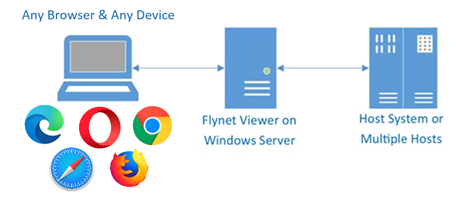For many years Mochasoft terminal emulators have been seen as a cost-efficient way for organizations to give simple access to legacy systems. Mochasoft’s client and web-based offerings have previously made them a popular choice for small and large organizations alike.
Unfortunately, despite their historic usage, some of these emulators are now no longer viable for the majority of organizations. A number of Mochasoft emulators require additional technologies which have been deprecated or contain components which require additional licensing. By using these emulators organizations may not be able to meet their insurance and regulatory requirements, or be forced to mandate deprecated technology. Jubilant have been approached by several organizations facing loss of access to their legacy systems and potential security issues.
Technical Challenges
Mocha TN5250 for Windows 10 requires Internet Explorer to function. Mocha ActiveX TN5250 and Mocha ActiveX TN3270 require both Internet Explorer and the ActiveX plugin to function. Mocha TN5250 for Java, Mocha TN3270 for Java and Mocha Telnet for Java all require the Java plugin to function. These elements have already been deprecated or are facing deprecation by their vendors
- Internet Explorer is being deprecated by Microsoft, with Microsoft’s Internet Explorer support ending on June 15th 2022.
- The Java plugin and Web Start were both deprecated by Oracle as of the Java Development Kit 9 (JDK9) in 2017. As such they no longer receive any updates, most notably security updates.
- ActiveX is no longer supported by Microsoft as of Internet Explorer 10. Microsoft’s replacement for IE, Microsoft Edge, has no support for ActiveX.
Mochasoft emulators which rely on Internet Explorer to function will cease to be a viable option for most organizations once Microsoft stops supporting IE as of June 15th 2022. Likewise, continuing to use Mochasoft emulators which require Java may lead to organizations increasing their threat surface due to Java’s lack of security updates. Moreover, Mochasoft considers its Java Applet version to be “Retired” with no further updates planned. This situation means many organizations may fail to meet their organization’s security standards and requirements.
Mochasoft is aware of these deprecations, and as such run warnings on the respective product pages, alerting users to their potential issues.
Complications
Some organizations may choose to switch to an alternative client-side Mochasoft emulator to avoid these issues. Whilst this may be suitable for some clients, it will not be an option for all. Client-side software requires direct install onto each machine, which removes automatic centralization and makes it difficult to maintain and audit. It also complicates usage for third party and outside users who may need access to an organization’s legacy system, yet are unable or unwilling to download the client-side terminal emulator.
An organization may attempt to use VPN or VDI technology to maintain centralized functionality, however this situation can lead to administration issues and increased costs. The increased need for VPN or VDI licences from organizations such as Citrix can lead to a licensing bill which dwarfs the initial savings made on a more economic terminal emulator.
Alongside these security concerns organizations using a terminal emulator containing insecure and deprecated elements may struggle to gain ISO 9001 Certification. They also risk becoming uncompliant in data security standards such as GDPR or insurance policies.

Solutions
A solution to the issues surrounding Internet Explorer, ActiveX and Java is to move to a pure-html alternative emulator. Pure HTML emulators can be accessed on any existing web browser, regardless of device of operating system. Many are even optimized to offer responsive web experiences, allowing automatic scaling and native device functions like pinch to zoom.
Pure web emulators should require no downloads, outdated plugins, launchers, or additional software to operate. This allows for consistent maximum security and may allow for significant savings via reduced VDI or VPN licensing. Many web-based emulators are administered via a central server, giving maximum control for auditing and security.
